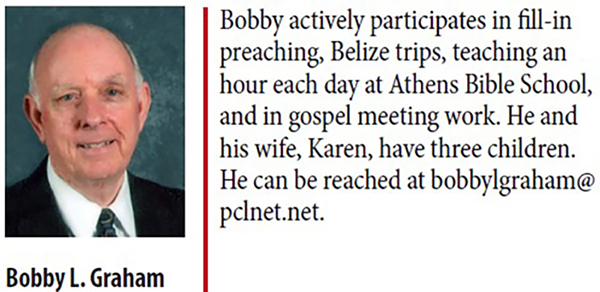
by Bobby L. Graham
What Is the Meaning of Luke 3:4-6?
This passage appears in the context where John the Baptist was teaching people to prepare them for the entrance of Christ upon the scene. Remember that John came as a harbinger or forerunner of Jesus for the purpose of making ready a people prepared for the Lord. In this section, he described such work in the language of road construction, because he was preparing a way/road upon which the Messiah might enter. Because the different parts of the passage are significant, we will quote Luke 3:3-6 here for study.
As it is written in the book of the words of Isaiah the prophet, saying: “The voice of one crying in the wilderness: ‘Prepare the way of the LORD; make His paths straight. Every valley shall be filled and every mountain and hill brought low; the crooked places shall be made straight and the rough ways smooth; and all flesh shall see the salvation of God’” (Luke 3:4-6, NKJV).
These verses set forth the essence of John’s preaching: a baptism of repentance for the remission of sins. He instructed people in the region of the Jordan River, a quite limited area for his work, to “make ready a people prepared for the Lord” (Luke 1:17). He taught them to be baptized on the basis of their repentance and desire for forgiveness, that they might become a people ready to hear and follow Jesus Christ. Repentance is still requisite to following Jesus Christ (Acts 2:38; 3:19; 17:30).
Next, we learn that John taught the people to prepare the way/road of the Lord. This way was not physical, but spiritual, because it wound its way through the hearts and lives of spiritually prepared people. In order to be included in this spiritual way for the Lord, they would have to repent and be baptized that their sins might be forgiven. Unrepentant, unbaptized people would not be ready, because sin still stained their lives.
John then told them five different actions they must take—actions involved in repentance—to bring their lives into line with God’s will. Each is expressed in the terms used for building a road, for they were building a spiritual road upon which the Messiah would enter and serve: (1) Make his paths straight; (2) Fill the valleys; (3) Make the mountains/hills low; (4) Straighten the crooked places; (5) Smooth the rough ways. By repenting, John’s listeners could change their lives so that the special road for the Messiah would run through their hearts and lives. They must bring low their mountains of pride, fill in the spiritual valleys void of righteousness and goodness, conform their crooked ways to the straight ways of the Lord, and smooth out the spiritually rough paths of unbelief with faith in Jesus Christ. These changes would constitute the fruits worthy of repentance, which John mandated they produce in Luke 3:8-14.
Jesus could definitely use such penitent souls as John urged them to live for His work of preparing others for His coming kingdom. They could become His servants assisting Him in the great work of causing all flesh to see the salvation of God. In addition to repenting, John instructed them to believe the gospel (Mark 1:14-15). By their acceptance of the gospel, they would be provided the information motivating them to be a people prepared for the Lord, ready to receive/enter the coming kingdom of the Messiah. I trust this study helps all readers to understand John’s work better.


